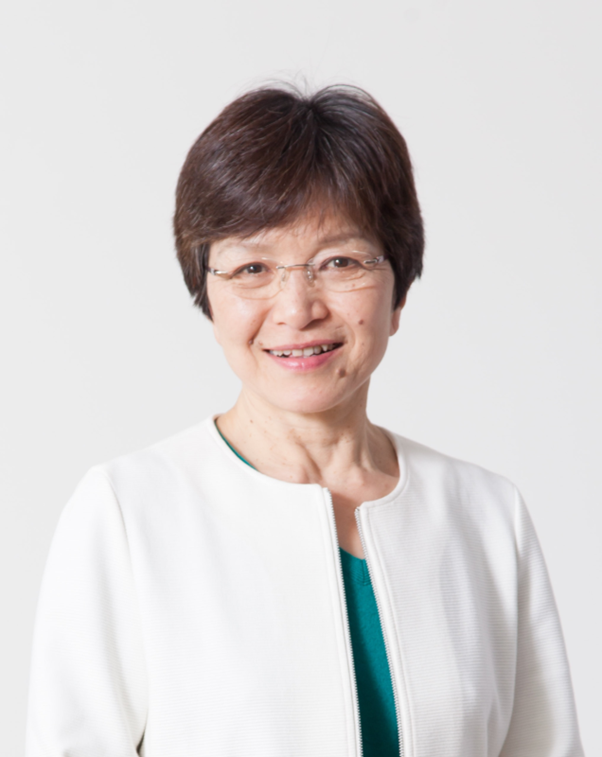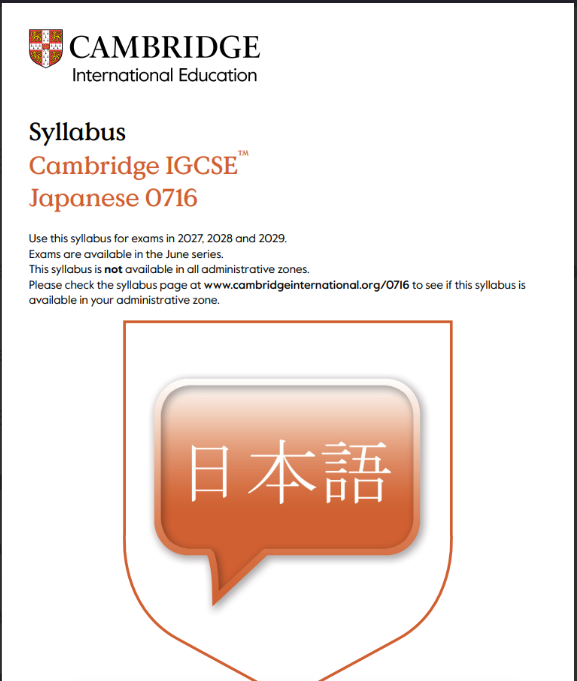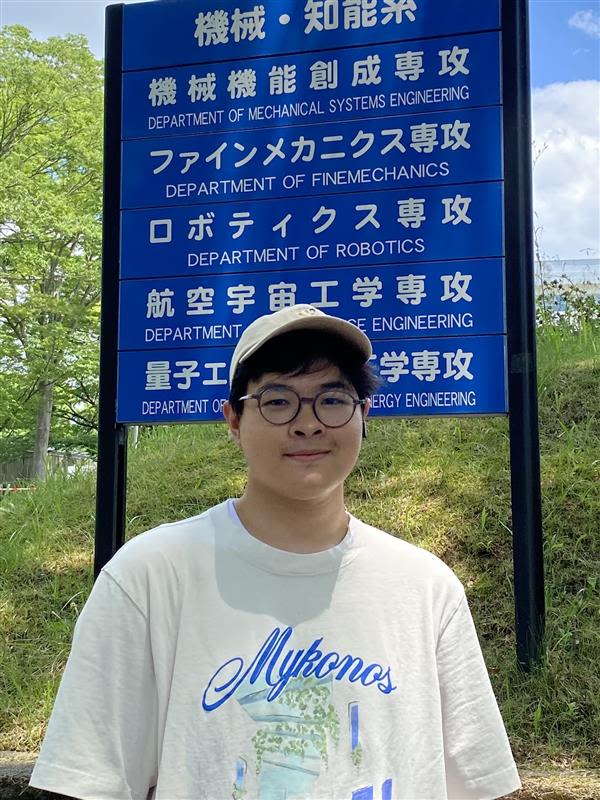Pathways to Japan: why more Cambridge students are choosing Japanese universities

A drive to grow the number of international students at Japanese universities, together with new recognition for Cambridge International A Level and a rise in English-taught courses, are just some of the reasons why Japan is an increasingly attractive study destination. But what else lies behind Japan’s popularity? We spoke to two former Cambridge students from Indonesia and a professor at Tohoku University to find out what Japan has to offer.

An increasingly attractive destination
When the 2025 Times Higher Education World University Rankings were published in October, Japan was the second most-represented nation after the US. The country has almost 800 public and private universities, offering some of the best higher education in the world.
Traditionally a popular study destination for Asian students, Japan is increasingly attracting students from around the world. The government has set an ambitious target to grow the number of international students in Japan to 400,000 a year by 2033, and universities are ‘internationalising’ by adding more English-taught courses.
‘Japanese pop culture, especially Monga/Anime, has become more popular among the young generation in the world
Yumiko Watanabe, Specially-Appointed Professor & Coordinator of the Future Global Leadership Program (FGL) at Tohoku University, attributes Japan’s popularity to a combination of academic, lifestyle and cultural factors. ‘The availability of very high-quality higher education compared to the cost of education and the cost of living, as well as the safety of the country, are certainly attractive [to international students]’, she says.
But she also notes a growing interest in all things Japanese: ‘Japanese pop culture, especially Monga/Anime, has become more popular among the young generation in the world,’ says Yumiko. ‘I believe that this has led to an increase in the number of people who are interested in a wider range of Japanese culture and Japan itself.’
Opportunities for Cambridge students
Japan’s Ministry of Education, Culture, Sports, Science and Technology (MEXT) has recently amended its policy to enable all public and private universities in the country to accept applications from Cambridge International A Level students. Together with the rise of English-taught courses at Japanese universities, this opens up new opportunities for Cambridge students.
On top of this, Cambridge has launched a new Cambridge IGCSE Japanese to help international students gain the foreign language skills they need to settle quickly in Japan.
These new developments pave the way for more Cambridge students worldwide to progress to Japanese universities, like Mateo and Jocelyn who are currently undergraduates in English-taught programmes at Kyushu University and Tohoku University.
Here, they tell their stories to inspire other Cambridge students about the study and scholarship opportunities open to them in Japan.
Yumiko Watanabe, Specially-Appointed Professor & Coordinator of the Future Global Leadership Program (FGL) at Tohoku University
Yumiko Watanabe, Specially-Appointed Professor & Coordinator of the Future Global Leadership Program (FGL) at Tohoku University
Student perspectives

Jocelyn – a third-year student studying Electrical Engineering and Computer Science (EECS) in Kyushu University, Fukuoka, Japan
‘I studied Cambridge International A Levels at BINUS SCHOOL Serpong in Indonesia. Cambridge International A Levels prepared me well for university by giving me strong academic skills and helping me become more disciplined. The challenging curriculum let me explore each subject in depth, especially maths. In Cambridge International A Level Mathematics, I learned different problem-solving techniques which has been very helpful in my university classes.
‘Aside from that, the topic coverage in Cambridge International A Levels crosses over the first year of university, so that really helped lessen the load while I eased into living in a foreign country.’
Many scholarship opportunities
‘I decided to study in Japan after visiting the country on a short holiday in 2019. I fell in love with Japan's clean, organised environment, and it felt like the perfect distance from home. The university curriculum here seemed interesting, and there were many scholarship opportunities.
‘Kyushu University’s new campus, the largest in Japan, is surrounded by beautiful nature, which I thought would be a great place to relax after studies. Ultimately, receiving a full-ride scholarship made my decision to come here final.
‘Life as an international student in Japan has been great, especially because of the amazing food! At Kyushu University, international students are required to take Japanese language courses during the first three semesters, which has helped me adjust gradually.
‘Studying in Japan has opened up several new opportunities for me. I’ve had the chance to interact with students from many different cultures, which has broadened my perspective. Being here has also allowed me to connect more deeply with my Indonesian culture, as I often represent it within the international community in Japan. Additionally, my Japanese language skills have improved, allowing me to communicate more effectively and feel more integrated into daily life here.
‘I’m still exploring my options for life after university. I’m looking forward to gaining more lab experience to see if I’m more drawn to research or hands-on applications. I’m particularly interested in the semiconductor industry, and with TSMC opening a new plant in Kumamoto, Japan, I’m excited to explore potential career opportunities in this field here in Japan.’
...my Japanese language skills have improved, allowing me to communicate more effectively and feel more integrated into daily life here.
Mateo Rafe Winarta – a first-year student studying a degree in Mechanical & Aerospace Engineering, as part of Tohoku University’s Future Global Leaders (FGL) Program
‘I studied Cambridge International A Levels at BINUS SCHOOL Serpong in my home country, Indonesia. The skills I’ve learnt through my A Levels were crucial for preparing me and helping me adapt to university life. One of the most important skills I’ve learnt is how to write properly and express my ideas coherently. This skill supported me through my university applications and continues to help me with my assignments and reports.
‘Cambridge International A Level Mathematics and Further Mathematics also helped me adapt to the pace and general difficulty of mathematics-based classes in university. Thanks to my mathematical foundation rooted in the A Levels, I feel as though most of the maths topics are either a review or an extension of what I’ve already learnt.’
One of the most important skills I’ve learnt is how to write properly and express my ideas coherently.
Affordability of education
‘I realised I wanted to study abroad quite early on, narrowing it down to either Japan or Germany, as I felt those two were good for studying engineering. In the end, I chose Japan as it’s relatively cheaper compared to Germany, and there are more scholarship options for undergraduates here.
‘I felt that living here as a student would be great as well – the food is stellar here, especially the seafood. The people here are also very warm and welcoming, and the international community is very tightly knit. Many communities welcomed me with open arms, and thanks to them I don’t really feel that homesick.
‘When I first arrived, I felt slightly overwhelmed with the amount of paperwork. However the university gave us a lot of support. At no point did I feel lost or confused, thanks to their help.
‘I’d learnt Japanese for a few years before coming here, so I could understand enough to survive. However, there are mandatory Japanese classes that lead you from the very basics. There are also many clubs around here, so you get a lot of opportunities to practise your Japanese. The dorms are also split evenly between Japanese students and foreign students as well.’
Cutting-edge technology
‘There are a lot of labs that I have the chance to enter here – close to 100 only for my major, which I think is huge! If I’m lucky, I’ll be in touch with a lot of very cutting-edge technology. A lot of these labs are doing joint research with private companies, so I hope I could get in contact with them as well.
‘As part of my scholarship, I will also join a programme visiting research facilities outside of my major as well, which I think is great for expanding my view on cutting-edge STEM topics too.
‘In terms of my extracurriculars, I’ve been considering joining my university’s cycling club. Every week they have “club runs” where they travel to different cities. I’d be getting opportunities to go through places I would have never thought of going, let alone on two wheels!’
Tips for Cambridge students
from Mateo and Jocelyn

Tips for Cambridge students from Mateo
If you’re not fluent in Japanese, I recommend taking the international (English-taught) programmes.
As someone who’s currently in an international programme, I must say that the selection process is very competitive. Find teachers at your school who can help you make a recommendation letter. Try to get good grades overall, but also take time to prepare your essays! Don’t ever rush your essays.
It is also important to know the customs and etiquette before you arrive, and it’s good to study the language ahead of time. Even though you get support from the university, being able to speak the language makes it so much easier to do everyday things and make friends with Japanese people.
Tips for Cambridge students from Jocelyn
I’d recommend learning as much Japanese as possible beforehand. Even basic language skills can make a big difference in your daily life.
It’s also important to research the curriculum and degree courses carefully to make sure they align with your academic interests and career goals. Japanese university programmes can be unique, so knowing if the course structure matches what you're looking for is essential.
Think about your long-term goals—whether you want to focus on academic research, prepare for a corporate job, or explore another path. Japan offers diverse opportunities, but having a clear goal will help you make the most of your university experience.
Pathways to Japan- support for Cambridge students
To find out how to apply to universities in Japan with Cambridge qualifications, and learn more about the country’s higher education system, go to our new Japan recognition pages.
Learning the Japanese language is excellent preparation for studying and living in Japan. Find out about our new Cambridge IGCSE Japanese qualification which is available for schools in Administrative Zones 4 and 5.




